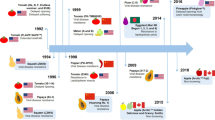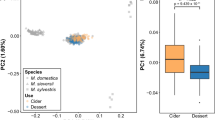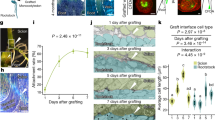Abstract
IN recent times two abnormalities have arisen in the apple Lord Lambourne when this variety has been grafted on to certain other kinds: (1) where the branches and growth lack rigidity, so that the weight of even a few fruits pulls the branches almost vertically to the ground, (2) where the fruit only develops about a quarter of normal size. Thus when Lambourne has been grafted on to the variety Excelsior, Lambourne has developed non-rigid growth, and when grafted on to Redcoat Grieve it has developed the small-fruit abnormality. The same reactions have occurred in Lambourne when it has been grafted on to certain other kinds.
This is a preview of subscription content, access via your institution
Access options
Subscribe to this journal
Receive 51 print issues and online access
$199.00 per year
only $3.90 per issue
Buy this article
- Purchase on Springer Link
- Instant access to full article PDF
Prices may be subject to local taxes which are calculated during checkout
Similar content being viewed by others
References
Crane, M. B., The Grower, 22, 53 (1944).
Darlington, C. D., Nature, 154, 166 (1944).
Salaman, R. N., and Le Pelley, R. H., Proc. Roy. Soc., B, 106, 140 (1930).
Author information
Authors and Affiliations
Rights and permissions
About this article
Cite this article
CRANE, M. Origin of Viruses. Nature 155, 115–116 (1945). https://doi.org/10.1038/155115b0
Issue Date:
DOI: https://doi.org/10.1038/155115b0
This article is cited by
-
Analysis of the apple rubbery wood disease by next generation sequencing of total RNA
European Journal of Plant Pathology (2017)
-
Abnormal Lignification in the Wood of some Apple Trees
Nature (1945)
Comments
By submitting a comment you agree to abide by our Terms and Community Guidelines. If you find something abusive or that does not comply with our terms or guidelines please flag it as inappropriate.



